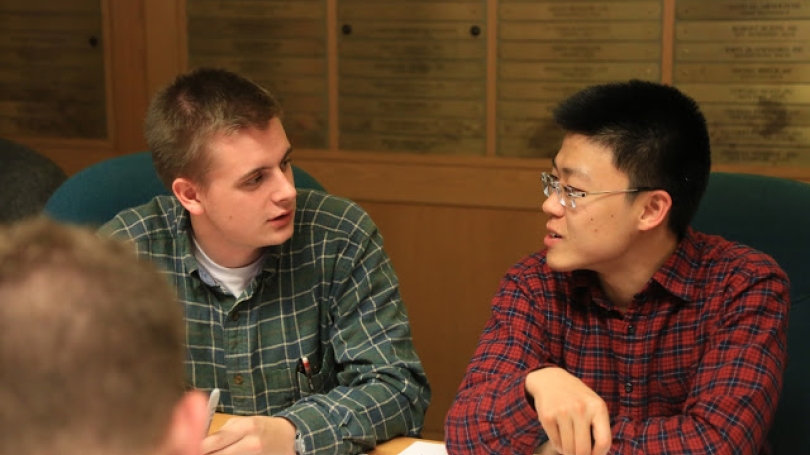On October 22nd, Engineering Professor Peter Robbie joined the Rockefeller Leadership Fellows meeting to lead a discussion on creative collaboration. “We live under the illusion of normalcy” was one of his first few messages, challenging us to think today instead as a time of revolution, empowering us to think critically about issues, and recognizing the importance of cultivating effective collaboration between thinkers.
 |
| Fellows question the illusion of normalcy through exercises. Photo by May Nguyen '18. |
As we learned, Design Thinking can be a critical tool for effective problem identification, team process, and idea generation. Defined as the combination of knowledge, skills, cognitive processes, and attitudes relevant in design, Design Thinking helps create effective solutions. It focuses on idea generation from the ground up: exploring the status quo and evaluating problems before jumping into the solution generation. We watched a short video clip of a GE Engineer, Doug Dietz, who designed an MRI scanner for kids; he had identified the issue that kids were very nervous of MRI scans and built a machine and patient experience that transformed the way kids are scanned. Having defining a problem, we learned how to ideate and brainstorm. For instance, encouraging yes’s rather than no’s, embracing forward-thinking crazy ideas, and piggy-backing on others’ ideas.
 |
| Fellows try to identify and solve problems at Dartmouth through design thinking. Photo by May Nguyen '18. |
Prior to forming groups to practice these skills, a member of Dartmouth’s improve comedy group, Casual Thursdays, led a “warm-up” exercise for us: we walked through the room acting out various comical scenarios, such as parachuting and digging a hole. The absurdity of this exercise set the tone well for creative thinking and for freedom of thought. Within small groups, we evaluated issues we faced in middle school and, equipped with the skills from earlier in the session, we were able to dive deep into the root causes. It was clear that such a problem-identification exercise would strengthen any future solution ideation. We then partic another problem identification exercise on improving community at Dartmouth—although a complex, multi-faceted topic, our Design Thinking skills enabled us to reach novel, maybe even crazy, ideas.
Professor Robbie’s session on Creative Collaboration equipped us with skills that will certainly be useful in settings ranging from the meeting room to daily activities. It will be interesting to explore further how we can apply these skillsets to additional aspects of leadership.
-Written by Tucker Oddleifson '16, Rockefeller Leadership Fellow
This ongoing series explores sessions of the Rockefeller Leadership Fellows (RLF) program. RLF provides fellows with resources in leadership theories and practical skills. Selected their Junior Spring, these Seniors take part in the workshops, dinner discussions, and team-building exercises as they gain a better understanding of the qualities and responsibilities necessary for leaders and successful leadership styles.


